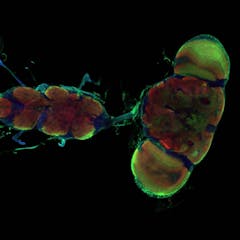
Articles on Alzheimer's disease
Displaying 121 - 140 of 351 articles

The new drug is based on the idea that a build-up of amyloid in the brain leads to the disease. But that hypothesis has been under scrutiny lately.

The first drug targeting Alzheimer’s disease has been approved in 20 years – but its approval isn’t based on substantial evidence.

The FDA approved Alzheimer’s disease drug aducanumab despite minimal evidence of its efficacy. Whether this decision ultimately hurts or helps patients depends on data researchers don’t yet have.

‘Dementia friendly’ communities seek to support people with memory loss, recognize them as equals, celebrate their contributions and enable them to live with purpose in welcoming communities.

Adaptable neurons are tied to learning and memory but also to neurological disorders. By studying fruit flies, researchers found a mechanism that controls neuroplasticity.

A neuroscientist and a clinician watched two new films about dementia. They recognised what they saw.

If so, it’s just one lifestyle risk among many others.

Nanodiamonds aren’t just cellular bling: they could be used to better understand the development of cancer in our cells.

It was first officially described 115 years ago, but we still do not have a cure for Alzheimer’s disease. The human brain is extremely complex, and Alzheimer’s is its most complex disease.

The final piece in the dementia puzzle is at the door.

Because dementia patients are more likely to acquire COVID-19, and because so many live in close-quarter facilities – like nursing homes – it’s critical to vaccinate them as quickly as possible.

The researchers developed a molecule which works to stop toxic proteins from building up in the brain.

In this new study, people who were overweight had fewer brain cells and lower levels of blood flow compared to people of a normal weight.

Knowing what cells are more vulnerable could some day help researchers know why these cells are more vulnerable than others.

The tiny air pollutants known as PM2.5, emitted by vehicles, factories and power plants, aren’t just a hazard for lungs. A study finds more brain shrinkage in older women exposed to pollution.

Our gut microbes play a key role in sending and receiving signals that influence the brain.

New statistics show that people with dementia have been particularly vulnerable during the pandemic.

Architects need to learn to see dementia not as a disease but as a disability, and shift the design focus to spaces that can help maintain the everyday functions of people with the condition.

Dementia and depression are two diagnoses that rob older adults of health and happiness. Despite their obvious differences, it is becoming ever more apparent that the two conditions are connected.

Drinking at “safe” levels was shown to reduce the amount of a person’s total brain tissue.
